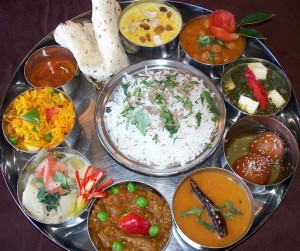
The word prasada means “mercy” or “blessings.” Therefore something coming back to the worshipper after being offered to a Deity is the mercy or blessings of that Deity. The counterpart of prasada is bhoga, which are the items being offered to the Deity. You might think, bhoga in prasada out. The word bhoga literally means “enjoyment.” Therefore anything enjoyable is a bhoga. So in effect, when we offer bhoga to a Deity we are offering enjoyment, nice things, to the Deity and we receive prasada, blessings in return. Many people think bhoga and prasada are food items alone. This is not true. Anything offered to the Deity and returned to the worshiper is bhoga and prasada, which includes flowers, incense, a flame and even shringar, Deity outfits. In ordinary language, food is called bhoga because it is enjoyable! The scent of the offered incense or flowers is a prasada. The light of the lamps that is “touched” by the hands and then “bathed” over the eyes and head is a prasada. The sound of the devotional prayers are a prasada and, of course, the offered food coming back is a prasada. Indeed, the whole point of a puja, archana, yajna or havan is the creation of prasada, blessings to the devotees. Puja, therefore, is an exchange of love between the devotee and the Deity. The devotee offers various bhogas to the Deity, which, in effect, convey the love of the devotee to the Deity, and the Deity reciprocates by sending His or Her love back to the devotee in the form of blessings, prasada.